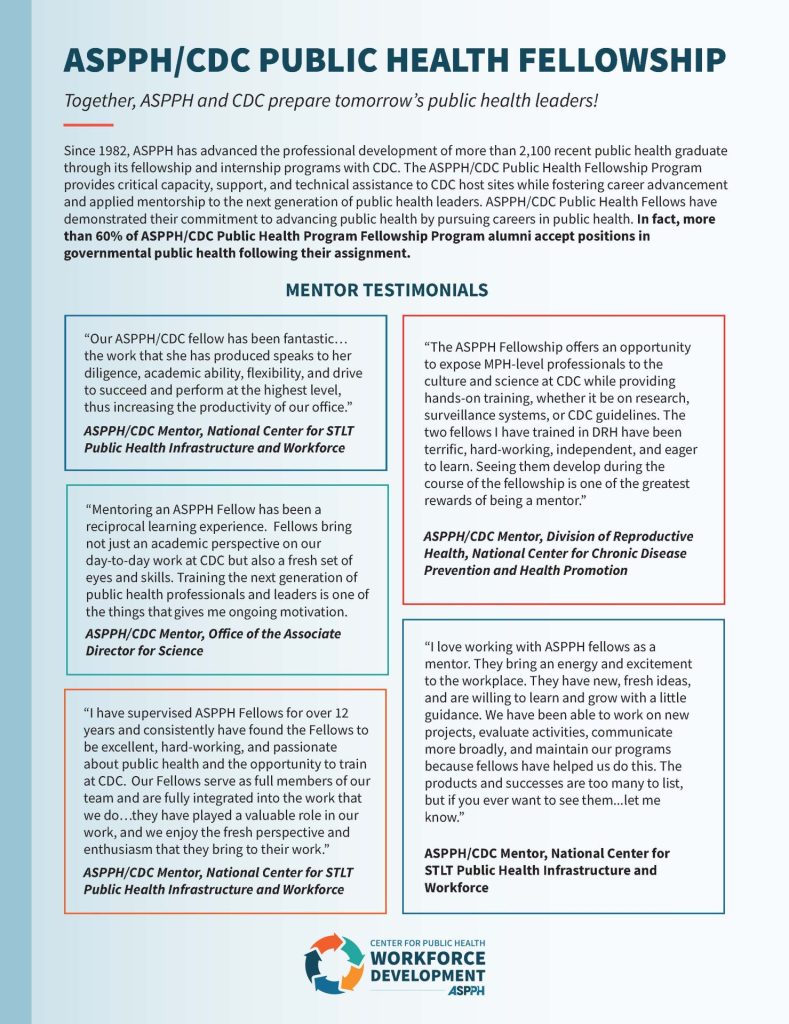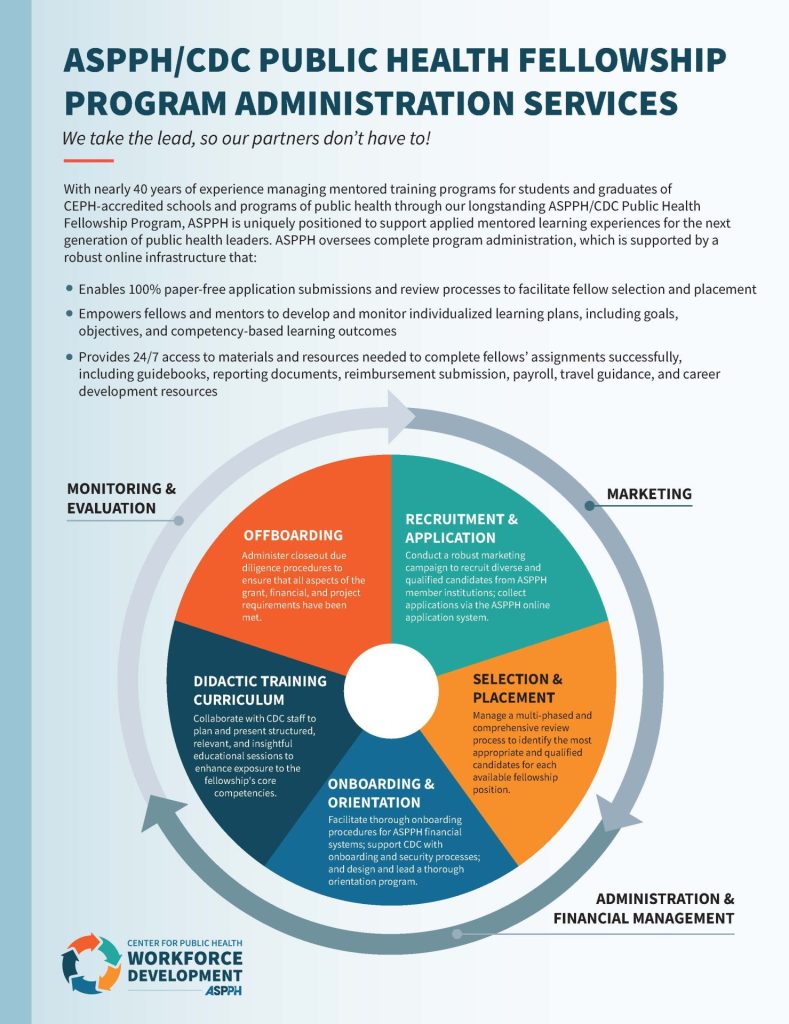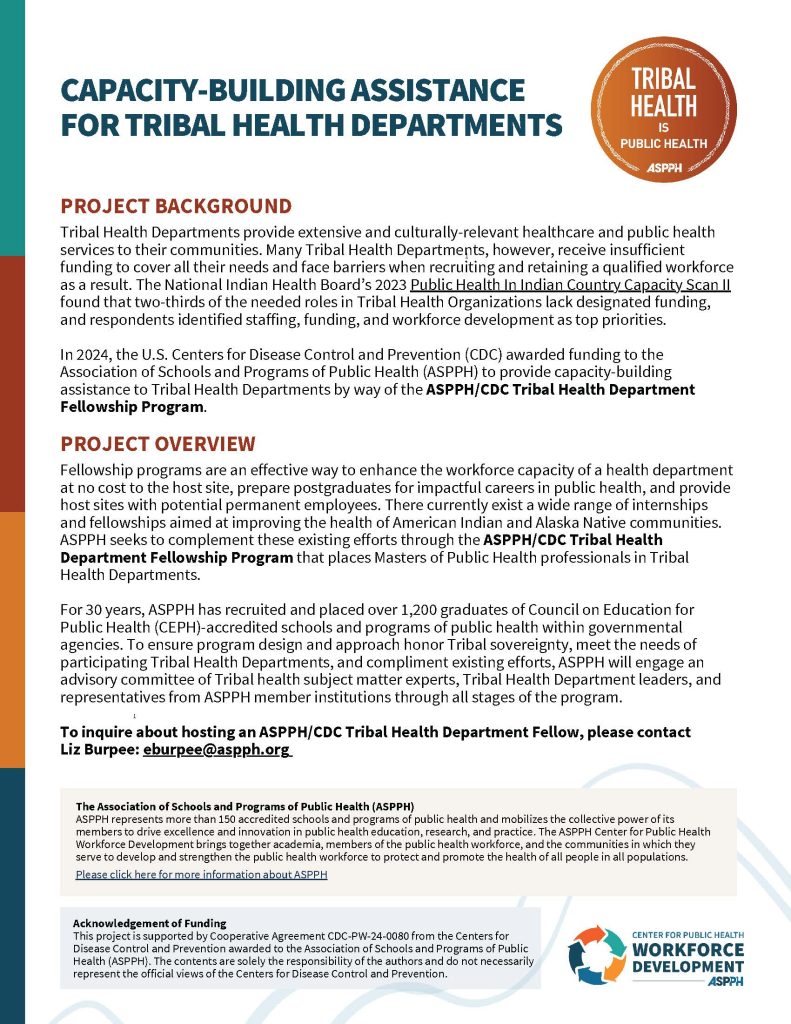
Applied Learning and Training
The Center seeks to support applied learning experiences that provide recent graduates with practical, mentored experiences in public health practice, policy, and leadership.

Applied learning and training bridges the gap between academic knowledge and real-world practice, ensuring that professionals are not only well-educated but also practically skilled and ready to address complex health challenges.
Public health work demands the ability to apply theoretical concepts in dynamic, unpredictable environments where technical expertise, leadership, cultural competence, and collaboration are crucial. Through applied learning experiences like apprenticeships, internships, fellowships, and practicums, public health professionals build hands-on skills and develop the flexibility and resilience needed for effective public health service. Applied learning and training fosters stronger connections between academia and practice settings, promotes innovation through experiential learning, and helps prepare the workforce to advance health equity in all communities.
Become a Host
ASPPH will work with you and your agency to design a custom applied learning and training program that advances your mission while providing a mentored training experience to future public health professionals.
Partner Agencies
With more than 40 years implementing applied learning and training programs with governmental public health partners, ASPPH has extensive experience preparing students and early-career professionals for impactful roles in public health. ASPPH collaborates with partner agencies to provide fellows and interns with applied learning and training placements where they can work alongside public health professionals while advancing the mission of the host agency. ASPPH works with each host agency to design and implement a custom applied learning and training program, using the web-based ASPPH Applied Learning and Training Portal as the foundation and platform for the unique experiences of each site preceptor/mentor, student/graduate, and faculty advisor.
ASPPH/CDC Public Health Fellowship Program
Since 1982, ASPPH has advanced the professional development of more than 2,100 recent public health graduates through its fellowship and internship program with CDC. The ASPPH/CDC Public Health Fellowship Program provides critical capacity, support, and technical assistance to CDC host sites while fostering career advancement and applied mentorship to the next generation of public health leaders. ASPPH/CDC Public Health Fellows have demonstrated their commitment to advancing public health by pursuing careers in public health. In fact, more than 60% of ASPPH/CDC Public Health Fellowship Program alumni accept positions in governmental public health following their assignment.

Mentor Testimonials
(PDF)
ASPPH/ONDCP Applied Practice Experience Program
In 2025, the White House Office of National Drug Control Policy (ONDCP) awarded funding to ASPPH to develop and implement the ASPPH/ONDCP Applied Practice Experience Program. This new initiative will place MPH students from ASPPH-member institutions in applied practicum experiences that advance ONDCP’s national drug control priorities. Through hands-on projects in research, policy analysis, and program evaluation, students will contribute to evidence-based strategies that address substance use disorders and overdose prevention. Building on ASPPH’s nearly four decades of experience managing federal applied learning and training programs, this new partnership will strengthen ONDCP’s research and policy capacity while preparing the next generation of public health professionals to translate science into action.
ASPPH/CDC Tribal Health Department Fellowship Program
In 2024, CDC awarded funding to ASPPH to design and implement a Tribal Health Department Fellowship Program to place MPH graduates in Tribal Health Departments. To ensure program design and approach honor Tribal sovereignty and meet the needs of participating Tribal Health Departments, ASPPH is engaging an advisory committee of Tribal health subject matter experts, Tribal Health Department leaders, and representatives from ASPPH member institutions. In concert with the advisory committee, ASPPH is currently developing program strategy and fostering formal partnerships with Tribal Health Departments.

The ASPPH Center for Public Health Workforce Development offers several applied learning and training opportunities to students and graduates of our member institutions.

Apprenticeship
An apprenticeship is a structured work-based learning program that combines on-the-job training with classroom instruction. Apprenticeships are common in skilled trades but are also an important component in building the public health workforce. Apprenticeships typically last longer than internships or practicums, ranging from one to three years. They differ from fellowships in that they focus on gaining practical, job-specific skills that lead to the acquisition of a professional certification or credential. The apprentice works under the guidance of an experienced mentor, gradually learning the skills and applied knowledge required to become proficient as a public health practitioner.

Internships
An internship is a short-term, temporary training experience that provides students with practical exposure to the public health field. Internships typically occur during the summer and may or may not fulfill practicum requirements for a public health degree, as this will vary by school or program. Internships allow individuals to apply their academic knowledge to real-world tasks while gaining valuable insights into the workings of a public health organization. They are designed to help students build professional skills, make connections, and increase their employability in the future.

Fellowships
A Fellowship is an early career opportunity designed to provide recent graduates with mentorship and professional development resources to advance their training in public health. These opportunities typically occur at U.S. federal agencies that work on public health initiatives and last one to three years. During their post-graduate training, fellows engage in hands-on, collaborative projects while applying the knowledge they learned in the classroom. As a result, fellows gain high-quality practical experiences that provide them with the skills and confidence to excel as the next generation of leaders in public health.

Practicum
A practicum is a hands-on, real-world experience that uses crosscutting learning to apply theoretical knowledge in a professional setting. Often required as part of public health education, a practicum allows students to work under supervision in a setting relevant to their area of study. It helps students build practical skills, deepen their understanding of theoretical concepts, and gain exposure to the daily challenges and responsibilities of the public health profession. The practicum is typically part of the public health graduate curriculum and provides course credit to students.

